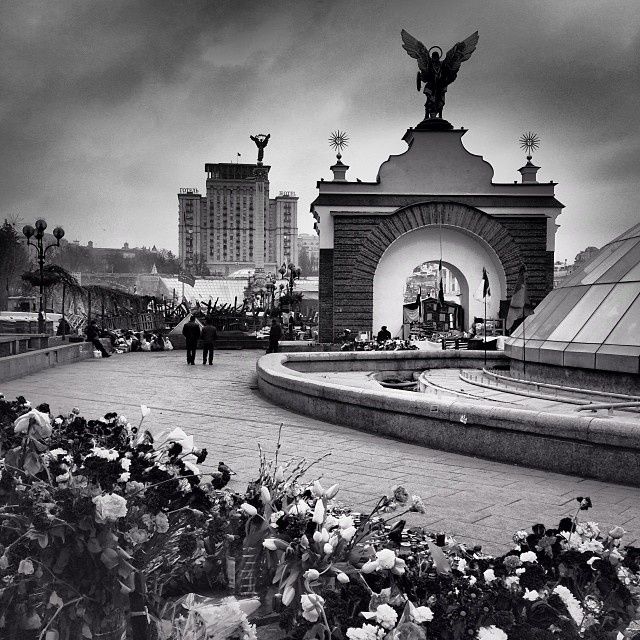February 22, 2019
We're now five years on from the mass protests on the Maidan, Kiev's central square, where Ukrainians with widely diverging values and visions of their country's future braved bullets to oust then-President Viktor Yanukovych, Moscow's man in Kiev. My friend and fellow Signal author Alex Kliment was in Kiev at the time, and you can see some of the photos he took here.
During weeks of demonstrations, more than 100 were killed and 2,500 injured in clashes with police. Yanukovych then fled to Moscow under cover of darkness, and Vladimir Putin ordered the invasion of Crimea. A continuing Kremlin-backed insurrection in two of Ukraine's eastern provinces has killed more than 10,000 people.
Five years later, what is the lasting impact of Maidan, known widely in Ukraine as the "Revolution of Dignity?" Putin's military response to the demonstrations prevented an imminent move by Ukraine to more deeply integrate with European institutions. But Russian military aggression also made enemies of millions of Ukrainians, many of whom were ambivalent about their country's centuries-old relationship with Russia before Putin's land-grab in Crimea and the Russian-fueled separatist uprisings in the east.
Yet, despite European sympathy with the country's isolation, Ukraine's many internal problems have allowed little progress toward possible membership in the European Union. With an election approaching next month, political infighting, corruption, and public cynicism run deep. The low-level conflict with Russia continues.
A poll conducted in December suggests a sharp division of opinion on what the Maidan protests were all about. In the survey, 52 percent of respondents said they have a positive view of the protests. Some 47 percent said demonstrators were angered by Yanukovych's bid to block Ukraine's integration into Europe, and 35 percent called it an opposition-led coup.
Finally, according to Amnesty International, justice for those killed in the Maidan by police and government snipers has not come. The rights group says 288 individuals have been charged and gone to court. Just 52 cases have produced a verdict. Of 48 convictions, just nine people have been sentenced—and not one of those imprisoned is a former police officer.
This is an election year in Ukraine, and voters will be looking for presidential and parliamentary candidates who can move the country beyond its chronic problems and current stalemate with Russia. Each candidate will face the question of how best to explain the lessons of Maidan and their importance for Ukraine's future.
More For You
Ian Bremmer sits down with former US Ambassador to NATO Ivo Daalder to unpack a historic shift in the transatlantic alliance: Europe is preparing to defend itself without its American safety net.
Most Popular
Think you know what's going on around the world? Here's your chance to prove it.
U.S President Donald Trump, U.S. Vice President JD Vance, and U.S. Secretary of State Marco Rubio pose for a family photo with other representatives participating in the inaugural Board of Peace meeting, at the U.S. Institute of Peace in Washington, D.C., U.S., February 19, 2026.
REUTERS/Kevin Lamarque
Argentina, Armenia, Belarus, Egypt, Indonesia, Jordan, Pakistan, Paraguay, Vietnam – to name only a few.
A poster featuring Andrew Mountbatten-Windsor, formerly known as Prince Andrew, is installed on a sign leading to the parking area of the Sandringham Estate in Wolferton, as pressure builds on him to give evidence after the U.S. Justice Department released more records tied to the late financier and convicted sex offender Jeffrey Epstein, in Norfolk, Britain, February 5, 2026.
REUTERS/Isabel Infantes
British police arrested former Prince Andrew Mountbatten-Windsor today over allegations that in 2010, when he was a UK trade envoy, he shared confidential government documents with convicted sex offender Jeffrey Epstein.
© 2025 GZERO Media. All Rights Reserved | A Eurasia Group media company.
